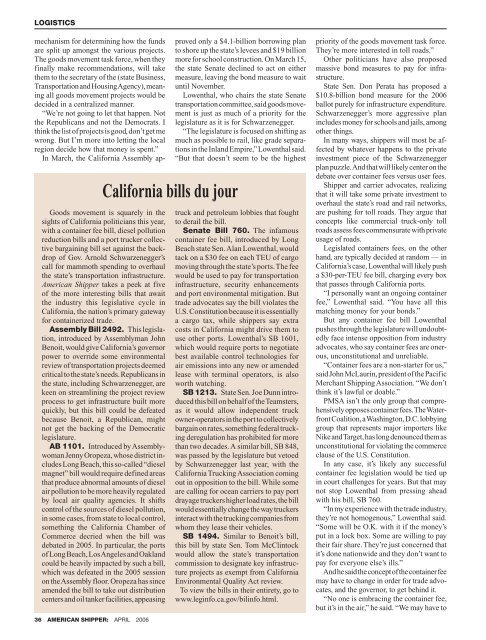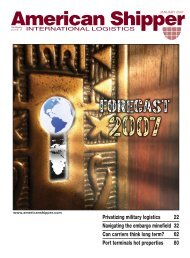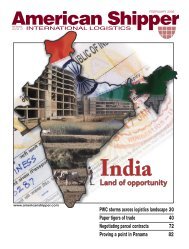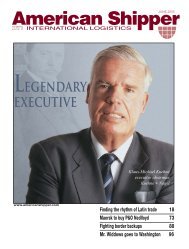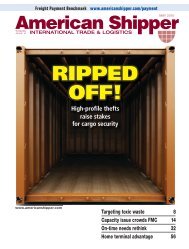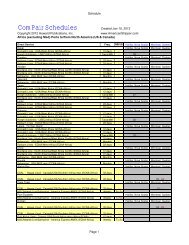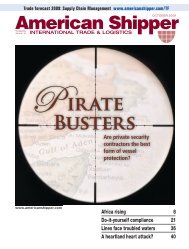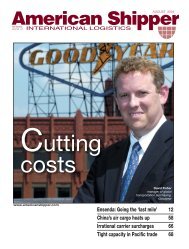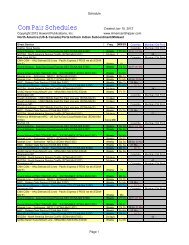McLean's - American Shipper
McLean's - American Shipper
McLean's - American Shipper
- No tags were found...
Create successful ePaper yourself
Turn your PDF publications into a flip-book with our unique Google optimized e-Paper software.
LOGISTICS36 AMERICAN SHIPPER: APRIL 2006California bills du jourGoods movement is squarely in thesights of California politicians this year,with a container fee bill, diesel pollutionreduction bills and a port trucker collectivebargaining bill set against the backdropof Gov. Arnold Schwarzenegger’scall for mammoth spending to overhaulthe state’s transportation infrastructure.<strong>American</strong> <strong>Shipper</strong> takes a peek at fiveof the more interesting bills that awaitthe industry this legislative cycle inCalifornia, the nation’s primary gatewayfor containerized trade.Assembly Bill 2492. This legislation,introduced by Assemblyman JohnBenoit, would give California’s governorpower to override some environmentalreview of transportation projects deemedcritical to the state’s needs. Republicans inthe state, including Schwarzenegger, arekeen on streamlining the project reviewprocess to get infrastructure built morequickly, but this bill could be defeatedbecause Benoit, a Republican, mightnot get the backing of the Democraticlegislature.AB 1101. Introduced by AssemblywomanJenny Oropeza, whose district includesLong Beach, this so-called “dieselmagnet” bill would require defined areasthat produce abnormal amounts of dieselair pollution to be more heavily regulatedby local air quality agencies. It shiftscontrol of the sources of diesel pollution,in some cases, from state to local control,something the California Chamber ofCommerce decried when the bill wasdebated in 2005. In particular, the portsof Long Beach, Los Angeles and Oaklandcould be heavily impacted by such a bill,which was defeated in the 2005 sessionon the Assembly floor. Oropeza has sinceamended the bill to take out distributioncenters and oil tanker facilities, appeasingmechanism for determining how the fundsare split up amongst the various projects.The goods movement task force, when theyfinally make recommendations, will takethem to the secretary of the (state Business,Transportation and Housing Agency), meaningall goods movement projects would bedecided in a centralized manner.“We’re not going to let that happen. Notthe Republicans and not the Democrats. Ithink the list of projects is good, don’t get mewrong. But I’m more into letting the localregion decide how that money is spent.”In March, the California Assembly approvedonly a $4.1-billion borrowing planto shore up the state’s levees and $19 billionmore for school construction. On March 15,the state Senate declined to act on eithermeasure, leaving the bond measure to waituntil November.Lowenthal, who chairs the state Senatetransportation committee, said goods movementis just as much of a priority for thelegislature as it is for Schwarzenegger.“The legislature is focused on shifting asmuch as possible to rail, like grade separationsin the Inland Empire,” Lowenthal said.“But that doesn’t seem to be the highesttruck and petroleum lobbies that foughtto derail the bill.Senate Bill 760. The infamouscontainer fee bill, introduced by LongBeach state Sen. Alan Lowenthal, wouldtack on a $30 fee on each TEU of cargomoving through the state’s ports. The feewould be used to pay for transportationinfrastructure, security enhancementsand port environmental mitigation. Buttrade advocates say the bill violates theU.S. Constitution because it is essentiallya cargo tax, while shippers say extracosts in California might drive them touse other ports. Lowenthal’s SB 1601,which would require ports to negotiatebest available control technologies forair emissions into any new or amendedlease with terminal operators, is alsoworth watching.SB 1213. State Sen. Joe Dunn introducedthis bill on behalf of the Teamsters,as it would allow independent truckowner-operators in the port to collectivelybargain on rates, something federal truckingderegulation has prohibited for morethan two decades. A similar bill, SB 848,was passed by the legislature but vetoedby Schwarzenegger last year, with theCalifornia Trucking Association comingout in opposition to the bill. While someare calling for ocean carriers to pay portdrayage truckers higher load rates, the billwould essentially change the way truckersinteract with the trucking companies fromwhom they lease their vehicles.SB 1494. Similar to Benoit’s bill,this bill by state Sen. Tom McClintockwould allow the state’s transportationcommission to designate key infrastructureprojects as exempt from CaliforniaEnvironmental Quality Act review.To view the bills in their entirety, go towww.leginfo.ca.gov/bilinfo.html.priority of the goods movement task force.They’re more interested in toll roads.”Other politicians have also proposedmassive bond measures to pay for infrastructure.State Sen. Don Perata has proposed a$10.8-billion bond measure for the 2006ballot purely for infrastructure expenditure.Schwarzenegger’s more aggressive planincludes money for schools and jails, amongother things.In many ways, shippers will most be affectedby whatever happens to the privateinvestment piece of the Schwarzeneggerplan puzzle. And that will likely center on thedebate over container fees versus user fees.<strong>Shipper</strong> and carrier advocates, realizingthat it will take some private investment tooverhaul the state’s road and rail networks,are pushing for toll roads. They argue thatconcepts like commercial truck-only tollroads assess fees commensurate with privateusage of roads.Legislated containers fees, on the otherhand, are typically decided at random — inCalifornia’s case, Lowenthal will likely pusha $30-per-TEU fee bill, charging every boxthat passes through California ports.“I personally want an ongoing containerfee,” Lowenthal said. “You have all thismatching money for your bonds.”But any container fee bill Lowenthalpushes through the legislature will undoubtedlyface intense opposition from industryadvocates, who say container fees are onerous,unconstitutional and unreliable.“Container fees are a non-starter for us,”said John McLaurin, president of the PacificMerchant Shipping Association. “We don’tthink it’s lawful or doable.”PMSA isn’t the only group that comprehensivelyopposes container fees. The WaterfrontCoalition, a Washington, D.C. lobbyinggroup that represents major importers likeNike and Target, has long denounced them asunconstitutional for violating the commerceclause of the U.S. Constitution.In any case, it’s likely any successfulcontainer fee legislation would be tied upin court challenges for years. But that maynot stop Lowenthal from pressing aheadwith his bill, SB 760.“In my experience with the trade industry,they’re not homogenous,” Lowenthal said.“Some will be O.K. with it if the money’sput in a lock box. Some are willing to paytheir fair share. They’re just concerned thatit’s done nationwide and they don’t want topay for everyone else’s ills.”And he said the concept of the container feemay have to change in order for trade advocates,and the governor, to get behind it.“No one is embracing the container fee,but it’s in the air,” he said. “We may have to


